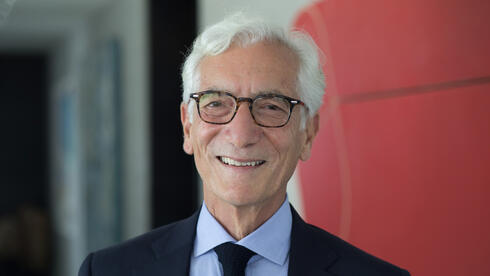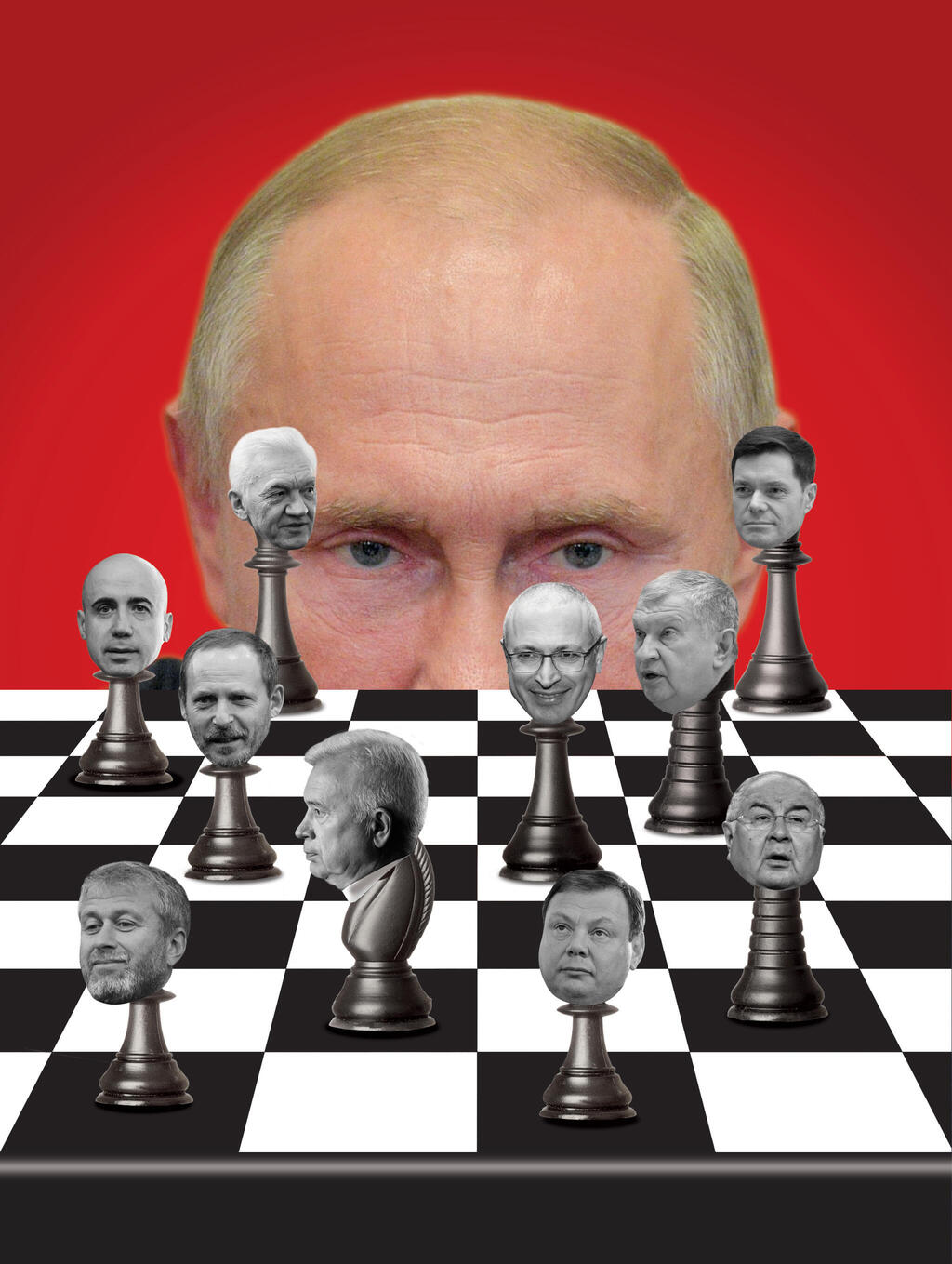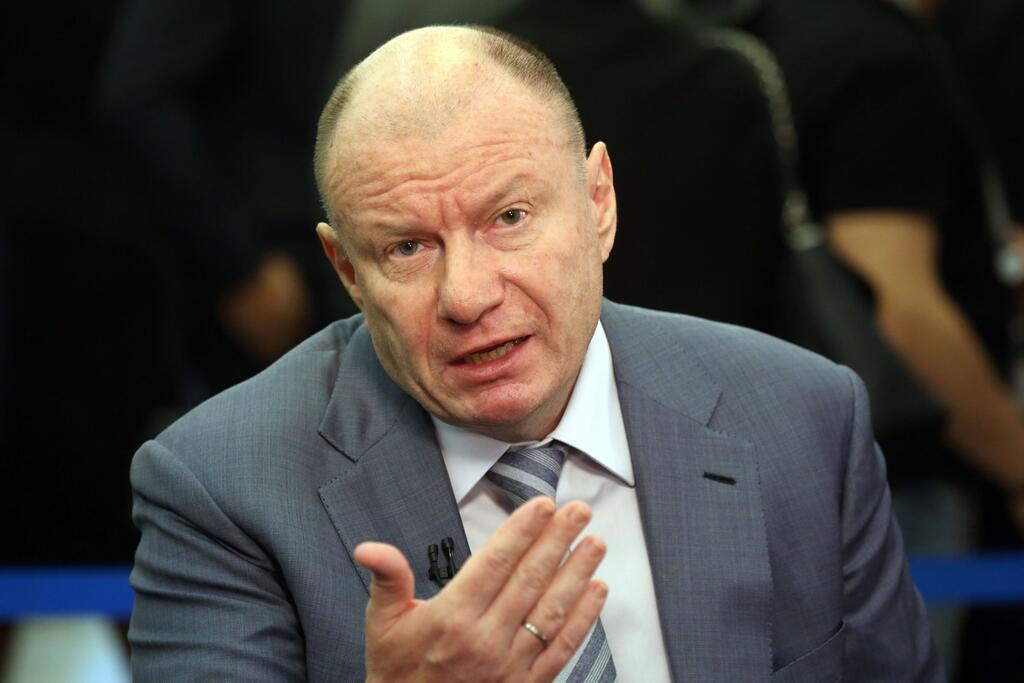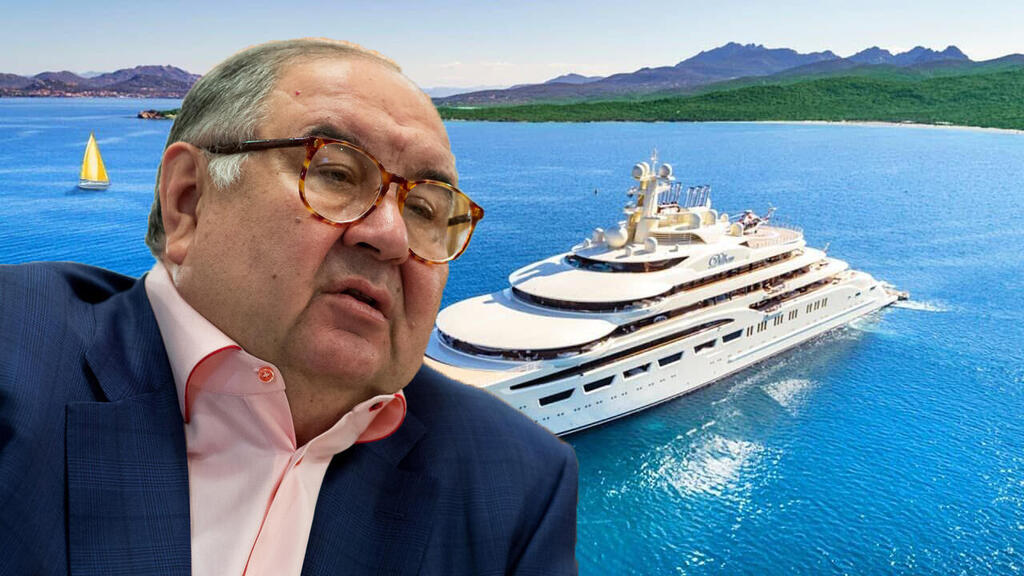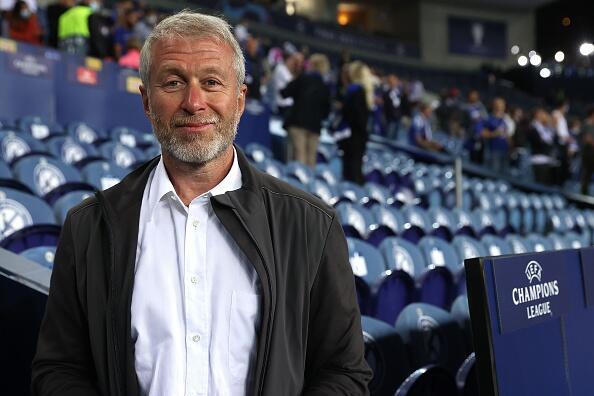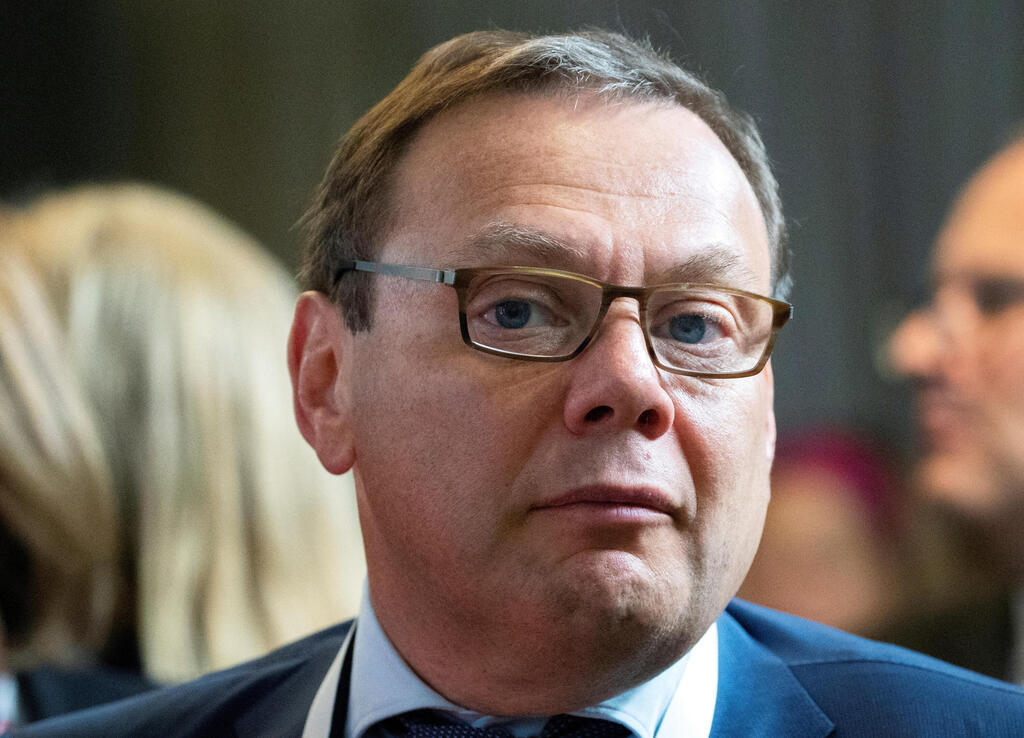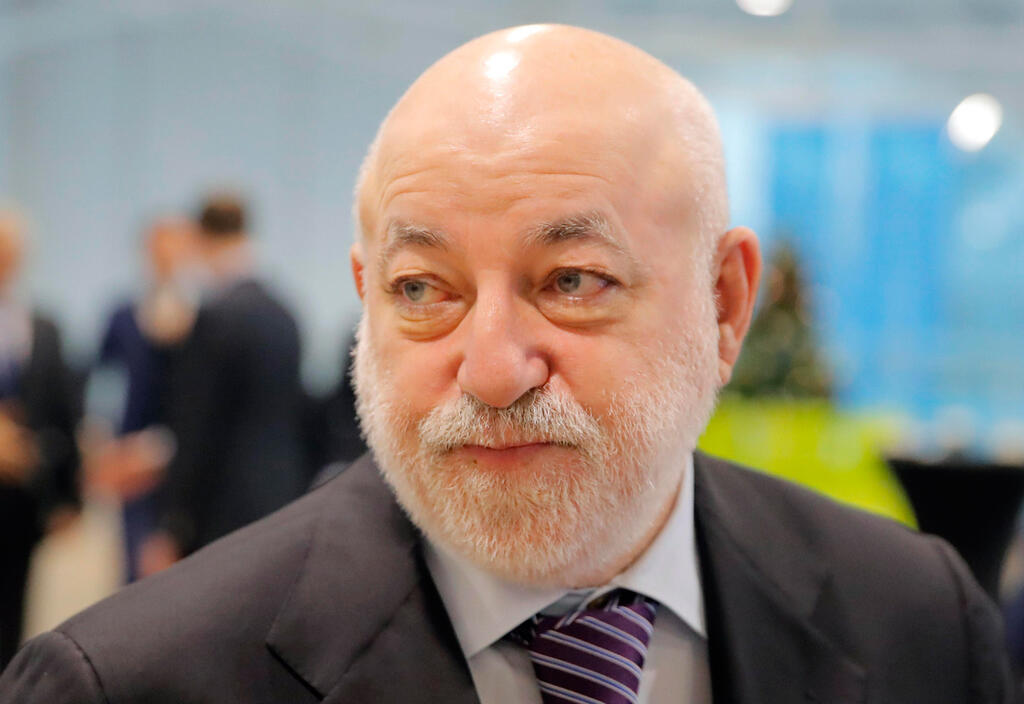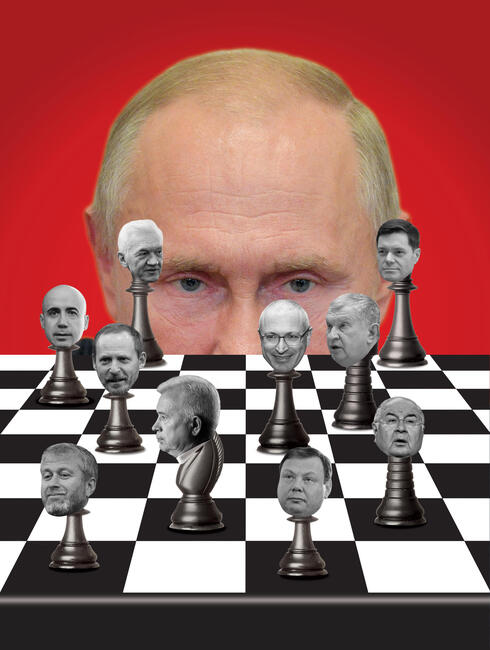
These are the Russian oligarchs circling Putin
Toy soldiers or a hope for a coup? Here's a rundown of the oligarchs surrounding the Russian president and why the West should lower their expectations of them
If there’s one obvious thing the West is trying to achieve with its economic sanctions on Russia, it's putting the squeeze on the Russian oligarchs associated with President Vladimir Putin. However, more than the oligarchs themselves are centers of power, they are a symbol of Russia's messy and corrupt regime. Their stories of how they got rich are full of holes, and their photos showing them smiling alongside Putin are too numerous to count. Yes, some of them even play active roles in the government, parliament or government companies. Everything is connected and wraps tightly around the president, who ostensibly owns no property other than an apartment in Moscow and a dog, but in practice is probably the richest man in the world with assets of $100 billion.
Through Putin's wallets, which are being emptied by sanctions, America and Europe hope to reach Putin and his "voice of reason." But this is a grave mistake by the West which perceives an economic threat as an existential threat to power. "As far as Putin is concerned, you can strip down the oligarchs to their underwear, put them in the city square, and he wouldn’t bat an eye,” one of Russia's richest men, who personally knows a large number of famous oligarchs, told Calcalist.
"You could say it's already happened - everyone already understands that the money is gone. The money in banks in Russia is no longer worth anything, and the banks outside Russia have mostly closed the oligarchs’ accounts, or, in a best case scenario for them, their assets have not been frozen yet. Even their children are being thrown out of prestigious boarding schools and universities. Putin himself doesn’t really care. He has completely isolated himself in recent years from everyone." The longing to isolate himself, which he has talked about for the past decade, was fueled by the two years of the pandemic, in which he moved away from everyone and secluded himself - ostensibly so as not to catch Covid, in light of his advancing age.
The general consensus in Russia today is that the inner circle is no longer as influential as it used to be, especially not on security issues. Three figures closely surround Putin these days. Friends who served with him in the KGB branch of Dresden, until, to their chagrin, they were called home with the fall of the Berlin Wall and the disintegration of the Soviet Union. Their names do not star in any of the news stories about sanctions on the wealthy and they do not have billions, but they are the heads of Russia's security forces - Nikolai Patrushev, Alexander Bortnikov and Sergey Naryshkin- the equivalent of Israel’s intelligence, Shin Bet and Mossad chiefs. These three were first exposed to the general public outside Russia in the photos of the embarrassing meeting they attended on the eve of the Russian invasion of Ukraine, sitting like reprimanded children in front of Putin as he demanded that they sit socially distanced from him.
Among the oligarchs, ironically, the most important people (until recently) in the multi-billion dollar yacht-owning group are the people who actually hold the least money - at least on paper. On the one hand, these are Igor Sechin and the Rotenberg brothers, in Putin's closest circle, and on the other hand you have Mikhail Khodorkovsky. Sechin and Rotenberg do not hold a single physical strategic asset other than a historic proximity to Putin. If they want to and are convincing enough, maybe they can get him to agree to a ceasefire. On the other side is Khodorkovsky, who was once in their position and today is a released prisoner who can not return to his homeland and almost nothing remains from his billions. The tragic figure of the oligarch, who only dared to imagine confronting Putin and criticized his rule some 20 years ago, hovers over the whole incident. It is a living reminder of what can happen to those who go against the Tsar.
This is why Putin is still sitting in the Kremlin and the oligarchs are silent. In order to bond together against him they have to admit to each other that this is their desire and risk their fortune and their lives. In the current state of affairs the ten years Khodorkovsky spent in the Siberian prison are a dream scenario, because the more likely scenario is an immediate bullet in the head via the Stalin method.
The oligarchs are therefore silent, and in their routine disconnection they turn those interested in their silence to the people: "What does it matter if five rich people, who Putin cannot stand anyway, say they are against him?", says a source close to several oligarchs. "Only if a million people who lost their jobs following the departure of Western companies from Russia and are hungry for bread after the collapse of the ruble take to the streets, will it be possible to oust the dictator."
Here is a rundown of the main “players” in this story:
The inner circle: Putin's 'wallets'
If there are wealthy people who can influence Putin, it is members of his inner circle. These are not Russia's original oligarchs - the same businessmen who attended the famous privatization celebration during Boris Yeltsin's era - but childhood friends and associates whom Putin padded in billions of rubles throughout his reign and are therefore also called "Putin's wallets."
Unlike the "original" generation of oligarchs, most of whom are now in their fifties, the inner circle is older and are near 70, similar to Putin himself. These are the people who are training with Putin in judo, funding his secret palace on the shores of the Black Sea and dominating the most formidable conglomerates in Russia: from Rosneft to Severstal to Nornickel. These are also the oligarchs who are under the most harsh criticism, with social networks flooded with images of damaged military equipment and expired combat food rations- evidence of the depth of waste of the oligarchs, who invested more in yachts than in weapons, as Putin thought.
Igor Sechin (61)
Major holdings: There are no known assets under his control, and his fortune is estimated in the broad range of $ 0.2-2.5 billion.
How he got rich: Unlike most oligarchs who come from engineering or mineral backgrounds, Sechin was a translator, and some believe he knew Putin in the KGB. As soon as Putin entered the Kremlin in 2000, he appointed Sechin deputy chief of staff. In 2004, he was appointed chairman and CEO of Rosneft, the large state-owned oil company, which on the eve of the war was traded for about $80 billion - and he is still in office. In 2008-2012, he also served as deputy prime minister.
Sechin is probably the poorest oligarch on the list, but also the most powerful of them all, being that he is considered Putin's right-hand man and his closest adviser since the 1990s, when Putin was deputy mayor of St. Petersburg. In Russia he is nicknamed "Darth Vader".
Sechin is the one who turned Rosneft into a giant monster by taking over its competitors: Khodorkovsky's Yukos, who accused Sechin of conspiring against him to put him in jail and take over the company; and BP - TNK, the Vekselberg-Fridman group's joint venture with Britain's BP, which the state has long been pressuring to sell. Today Rosneft is Russia, and Russia is Rosneft. The taxes paid by the company in 2020 covered almost half of the country's generous defense budget, and it also finances a large portion of Putin's secret palace spending on the Black Sea coast.
Sechin is also the Kremlin's main agent of chaos: he is behind the energetic rapprochement between Russia and China; and he is also the architect of the plan to build nuclear power plants in Venezuela during the time of Hugo Chavez.
Toys: The yacht Amore Vero ("True Love") which is 85.5 meters long and worth 120 million dollars.
Impact of sanctions: From 2014 he was banned from entering the United States and doing business with its citizens. Trading in Rosneft was stopped after the market value fell by about 90%. BP was the first of the Western companies to announce the liquidation of its holding in the company. Authorities in France have reported foreclosure on a yacht that apparently belongs to Sechin.
One more thing: Sechin's yacht was originally named Princess Olga after his second wife, who was 30 years younger than him, but after she left him in favor of an Italian racing driver, he changed the yacht’s name.
Alexei Mordashov (55)
Main holdings: The richest man in Russia; Owners of Severstal, one of the largest metal manufacturers in the world; Controlling shareholder in global tourism giant TUI; The owner of National Media Group, which owns many media outlets in Russia; The owners of the Lenta retail network and the owners of the cellular operator Tele2Russia.
How he got rich: He was a young economist in the factory where his parents also worked, and after the dissolution of the USSR he was appointed in charge of its privatization. After secretly purchasing a large shareholding from the plant's CEO, he ousted him and then took over his position. He later became close to the ruling administration thanks to his connections with his former lecturer in economics at the university, Anatoly Chubais, the privatization architect of Boris Yeltsin.
Toys: The Nord Yacht, one of the ten longest in the world - is 142 meters long, and is worth about $300 million.
Impact of sanctions: Already included in the blacklist in the previous round, on the eve of the current round of sanctions, he transferred some of the assets to his wife's name. The rest of the assets abroad were frozen, including the yacht.
One more thing: His picture appeared on the cover of the first issue of Forbes in Russia, which was published in 2004, as a symbol of the new status of the oligarchs.
Gennady Tymchenko (69)
Major holdings: Founded the oil trading company Gunvor, which mediates between the Russian oil giants and potential customers. Sold most of its holdings to its Western partner the day before the 2014 sanctions; owners of Novatek, Russia's second-largest gas producer, among the controlling shareholders of Rossiya Bank, which is considered the financier of senior government officials.
How he got rich: Tymchenko was not known to the general public until about a decade ago, when he was "exposed" and nicknamed the "shadow oligarch", who is considered Putin's closest friend.
Toys: A country club he founded with the Rotenberg brothers in St. Petersburg, where Putin practices judo. This is how the personal connection between the two was built. He built the largest ice rink in the world with an investment of more than $1 billion. Because of the sanctions he does not have a yacht, but he does own a plane for private flights.
Impact of sanctions: Included in all rounds of sanctions, because of which he has no credit cards that work and he can hardly leave Russia.
One more thing: He was born in Finland and holds Finnish citizenship. Does not use a computer or smartphone.
Brothers Boris (64) & Arkady (69) Rotenberg
Main holdings: SMP Bank, Moscow Sheremetyevo Airport and a number of construction companies, led by SGM, Russia's oil and gas infrastructure giant.
How they got rich: The two were childhood friends of Putin who grew up with him and served, among other things, as his friends in judo training. They are still training together at a club they set up at Putin’s request with Gennady Timchenko. Putin has given the brothers a series of generous tenders for their construction companies. Neither side is bothering to hide the connection or deny the surprising succession of tender wins, including the Crimean Bridge and about 20 billion euro infrastructure projects for the Sochi Olympics amounting to 5 billion euros. Putin's palace on the Black Sea coast, unveiled by opposition leader Alexei Navalny, is registered in the names of the brothers.
Toys: Boris owned a Bombardier plane that was confiscated in 2019 in sanctions.
Impact of sanctions: Placed into US sanctions back in 2014, but continued to do business there - including in the art trade at Sotheby's.
One more thing: Arkady's children have entered the family business and are already on the list of Russia's richest. Boris' children focused on sports - one is senior in the St. Petersburg hockey team, and the other acquired a Russian football team.
Vladimir Potanin (60)
Main holdings: Nornickel, one of the largest metal companies in the world.
How he got rich: Potanin is the flesh and blood of the Communist Party and one of the last real oligarchs still active in business. During the Soviet era he was one of the few lucky ones allowed to come into contact with foreign elements as a senior official in the Ministry of Foreign Trade and the Bank for International Cooperation. There he met Mikhail Prokhorov and together they set up a bank, which took part in "saving" Yeltsin's tenure. At the same time, Putinin also served in a senior position in the Yeltsin government. As a bonus to the aid, Potanin and Prokhorov gained control of a number of companies based on which they founded Norilsk Nickel (now Nornickel), one of the largest manufacturers of palladium, a strategically important metal that is sometimes high in gold because it is an integral part of the modern automotive industry and of nickel whose price has skyrocketed in recent days because of the situation - a ton of nickel costs more than a luxury car.
Toys: The 88-meter-long yacht "Nirvana" and the "Rosa Khutor" ski resort in Sochi, where the Olympic Games were held.
Impact of sanctions: Nurnickel shares have fallen sharply since the invasion of Ukraine, and Potanin has already lost more than $6 billion of his capital since the beginning of the year; In addition, he was removed from the board of trustees of the Guggenheim Museum in New York; And his yacht was seized by the French authorities.
-------------------------------------------------
The Muslims: The people with their hands on the valve
This power group, which dominates Russia's vast natural resources, was born out of the former Soviet Union's geographical structure: while the government sat at the western end of the country between Moscow and St. Petersburg, the oil fields, gas pipelines and a variety of minerals stretch between Siberia in the north, east and south, there are the Muslim republics, like Uzbekistan and Azerbaijan.
Local government officials, and especially their children, knew how to leverage the geographical proximity to the mines and the intimate acquaintance with them to acquire shares in the infrastructure companies in the privatization process led by Yeltsin in the 1990s. In the past, when their families still controlled the remote areas, this group had influence in the Kremlin and they were part of a circle relatively close to Putin, but as the republics became more independent they weakened politically.
The Muslim oligarchs are attentive to Putin and are careful not to make any sudden movements, but their importance to Putin and the West is so high with their hand on the oil valve and other important resources that Russia still sells to the West despite the sanctions.
Vagit Alekperov (70)
Main holdings: LUKOIL, Russia's largest oil producer.
How he got rich: Alekperov is probably the ultimate oligarch in the full sense of the word. He grew up in a family that worked in the Soviet oil industry in Baku, the capital of Azerbaijan, and easily rolled into a senior position in the industry. By the late 1970s he had already been appointed to head one of the Soviet oil companies. And when the Soviet Union disintegrated, he served as deputy minister of oil and gas affairs and oversaw the privatization of the industry. In the same privatization Rosneft was born, which today is headed by Igor Sechin, who received Roman Abramovich and his then partner Boris Berezovsky, Yukos who went to Mikhail Khodorkovsky and TNK acquired by Mikhail Fridman and his associates. But the diamond in the crown was kept by Alekperov for himself when he merged several small oil companies into one company, Lukoil, which became the largest in its field. In 2020 alone, he withdrew a $1.1 billion dividend.
Toys: A 70-meter-long yacht called the Galactica Supernova, which has a pool with a clear bottom and a waterfall. He also owns a Dutch shipyard, where some of the oligarchs’ yachts are built.
Impact of sanctions: Under partial restrictions since 2015. With the start of the invasion of Ukraine, Lukoil's stock plunged 63% on the London Stock Exchange, and has not been traded since then and is excluded from the main indices, so Alekperov has lost $13 billion since the beginning of the year.
One more thing: He is one of the largest coin collectors in the world and in 2015 he even opened a special museum for coins in Moscow.
Alisher Usmanov (68)
Main holdings: Metalloinvest, the largest mining and metals conglomerate in Russia; MegaFon, the second largest cellular operator in Russia; and he is one of the largest investors in Yuri Milner's DST investment fund, so he actually owns shares in Twitter, Zynga, Airbnb and more.
How he got rich: Usmanov was born into a politically connected family, and was the son of Tashkent's chief lawyer in the capital of Uzbekistan. In 1980 he was convicted and sentenced to six years in prison for fraud and theft, but after his release he was able to rebuild his fortune thanks to his connections and opened a factory to make plastic bags. In 1994, he was appointed chairman of the committee for collecting debts from gas companies, and as part of his role he privately acquired large shares in many gas companies, which he merged with the corporation from Teleinvest.
In 2000, when he was already one of the strongest and richest oligarchs in the country, the Supreme Court miraculously also decided to acquit him retrospectively of the case for which he was in prison, declaring that he was framed.
Toys: The 156-foot-long Dilbar yacht worth $600 million, one of the major shareholders in the Arsenal football club, Villa in Sardinia and several properties in England, including the "Sutton Place" estate of the Tudor dynasty.
Impact of sanctions: The villa in Sardinia and the yacht were confiscated.
One more thing: His Jewish wife of 30 years is Irina Wiener, the legendary coach of Russia's ground gymnastics team, which includes Alina Kabaeva, Putin's most famous mistress. It is estimated that this relationship, which began while Usmanov was in prison, is responsible for his proximity to Putin.
The Israelis: Yeltsin's Friends
The members of this group are the original oligarchs, the first to make the concept synonymous with a deep and inseparable relationship between capital and government. In 1996, then-President Boris Yeltsin feared that he would not be elected president and needed urgent financial assistance. So he turned to seven businessmen, most of them Jews, who provided him with $200 million and allowed him to be elected against all odds. In return, they received from him controlling shares in Russia's strategic resource companies for pennies. They have made companies modern, brought in partners from abroad and their value has leaped to billions.
However, most of these oligarchs today do not hold assets in Russia precisely for fear of events taking place in the past few weeks. Over the years, they have been careful to act wisely and do what Putin expects of them with the tragic figure of colleague Mikhail Khodorkovsky serving as a prime example. They know that Putin sees them as a foreign weeds identified with Yeltsin and could have made them give up all their assets if he merely wanted to. The intensity of the move can be seen in Fridman's press conference in London, where he went against Russia, and in Abramovich's announcement that he would contribute some of Chelsea's receipts to Ukraine. Some of the reasons for the courage are of course related not only to living in London, but also to their Israeli citizenship.
Roman Abramovich (54)
Main holdings: He is the controlling owner of the metal mining company EVRAZ and Chelsea Football Club.
How he got rich: At just 23 years old, barely finishing his studies in oil and gas, Abramovich opened a toy store and also began selling oil. He became the foster son and later the business partner of Boris Berezovsky, who was nicknamed the "Godfather of the Kremlin" and was one of the people closest to then-President Boris Yeltsin. Thanks to his connections, Abramovich gained control of Sibneft, one of the new oil companies created as part of the privatization.
When Putin came to power he clashed with Berezovsky, who fled Russia and reportedly transferred to Abramovich a long list of his assets in Russia, most of which he built up over the years. Abramovich, however, always has the right asset to pull out when the Russian president needs it. For example, with the establishment of Skolkovo, Russia's Silicon Valley on the outskirts of Moscow, it "became clear" that part of the land belonged to Abramovich, who of course rushed to donate it to a noble cause.
Toys: The particularly ostentatious yacht Eclipse, which is 162.5 meters long and houses a submarine and landing pad for three helicopters; An art collection estimated at $1 billion, estates around the world, and of course Chelsea.
Impact of sanctions: Has been sanctioned in the UK, leaving him with no option but to sell Chelsea; His EVRAZ shares have collapsed by 90% since the beginning of the war.
One more thing: He is the oligarch most identified with Israel and was forced to increase his presence here after the British authorities decided in 2018 not to renew his visa due to his ties with the Kremlin. In recent years, he has donated about half a billion dollars in Israel, including to Sheba Hospital and Yad Vashem, and donated land for the establishment of the Museum of Judaism and Tolerance in Moscow - which formed the basis of a letter sent by Israel to the United States embassy a couple of weeks ago requesting that Abramovich be spared sanctions.
Mikhail Fridman (56)
Main holdings: The Alfa and LetterOne holding groups, which own a German oil company, a cellular operator in Turkey, a cellular operator in Russia, Alfa Bank, one of the largest private banks in Russia, and the X5 network, the largest retailer in Russia.
How he got rich: The first business he set up in the 1980s was window washing, when he was in his twenties. Very quickly he recognized the opportunities created then from the collapse of the Soviet Union and established with partners Alfa Bank, one of the first private banks in Russia. In 1996, in exchange for Yeltsin’s assistance, he acquired the TNK oil company for several hundred million dollars, together with his partners Len Blavatnik and Victor Vekselberg. Fifteen years later, the three sold the company to government-owned Rosneft for $56 billion, and each left the deal with about $5 billion.
Today, Fridman is one of the few remaining members of that oligarchic elite, and although he tries to distance himself from the Kremlin, it is difficult to ignore the revolving door of Putin's senior officials who find positions at Alfa Bank and vice versa.
Toys: A mansion in London that he bought for £65 million and where he has lived since 2018.
Impact of sanctions: Alfa Bank was first included in the sanctions in the current round. Fridman himself is not under sanctions and was one of the few who came out calling for an end to the violence in Ukraine.
One more thing: Fridman is one of the active oligarchs in the Jewish context as one of the founders of the Jewish Congress in Russia. He is also one of the initiators of the pilgrimage in the Judean Desert, where the top Jewish oligarchs give up smartphones and vehicles for four days in favor of camels, water and basic tents.
German Kahn (60)
Main holdings: Partner in the Alfa and LetterOne holding groups.
How he got rich: Mikhail Fridman's close friend since graduating from the Moscow Faculty of Metals, and his partner in founding part of the business of the Alfa Group, whose main holding today is Alfa Bank, the largest private bank in Russia. He served as vice chairman of the oil company TNK-BP until it was sold to Rosneft. He then formed with Fridman the LetterOne group, which is registered in Luxembourg and invests in various companies in Europe.
Toys: Several estates in England, where he lives permanently, and in Tuscany.
Impact of sanctions: Alfa Bank entered the list of banks under sanctions in the current round.
One more thing: Kahan, a former boxer, is known as a lover of guns and weapons, and writes that he used to bring weapons to business meetings as well to demonstrate security flaws. He is very active in the Jewish Congress in Russia, and met his current wife on a flight to Israel, where she worked as a flight attendant.
Viktor Vekselberg (64)
Main holdings: Renova Investment Company
How he got rich: In 1996, together with his schoolmate Len Blavatnik, he founded the aluminum manufacturer SUAL, which was merged into ROSAL, the largest aluminum manufacturer in the world. With the exit money, they bought the shares in the oil company TNK, leveraged it into a joint venture with the British BP, and in 2013 sold it to Rosneft in a huge $56 billion deal - of which $5 billion went to Vekselberg , who became Russia's richest man that year. The deal was signed at Putin's estate and in his presence and stemmed from the Kremlin's desire to tighten its grip on the oil industry. On the way to it the Russian government exerted pressure on BP to sell the company for years, among other things by frequent raids on its offices and investigations by its managers in Russia. Vekselberg was later appointed to head the "Skolkovo" project, the Moscow Silicon Valley established by a government decision.
Toys: As a museum enthusiast, he established a Faberge Egg Museum in 2013 with an investment of millions of dollars. He owns several homes in the United States and Switzerland.
Impact of sanctions: Under U.S. sanctions since 2018 following suspicion of interfering in U.S. presidential elections, and since then his movement to the country has been restricted, and he has been removed from the board of MIT; His assets in foreign banks worth more than $2 billion have been frozen.
One more thing: He was the main investor in the failed Israeli start-up "The Fifth Dimension," of which Benny Ganz was chairman.
-------------------------------------------------
The quiet Jews
The unifying factor for the members of this group is only that they are Jews with the right of return, who are not identified with Israel or the many Jewish businessmen in Russia. As those ranked high on Russia's richest list, they may be the target of Western sanctions. And as they do not hold Israeli citizenship - they are more vulnerable, in case Putin is not satisfied with their behavior. Because of this they are mostly trying to keep a low profile and save what is left of their assets.
Mikhail Khodorkovsky (58)
Main holdings: The Quadrum Global Fund, which invests primarily in real estate in Europe and the United States. Finances a number of news sites in Russia that publish material against Putin's rule.
How he got rich: In the late 1980s, he founded a semi-party organization in cooperation with the Communist Party for Scientific and Technological Entrepreneurship for Young People. Later, as Russia began to allow entrepreneurship, the center became a software development company. Along the way, it also sold alcohol and was involved in another fashionable business in Russia in the early 1990s - stone washing jeans. Surprisingly, the company later became Menatep, one of the largest banks in Russia at the time. How did it happen? According to estimates, the jeans, alcohol and software development company probably also traded money through funding it received from the Communist Party.
With the expansion of the bank, Khodorkovsky made connections with the political echelon in Moscow, so that when Yeltsin's great privatization began, Khodorkovsky was already ready with a check from his bank, and for only $300 million he bought control of the Yukos oil company, which at its peak earned him the title of the richest man in Russia and one of the 20 richest in the world.
But the closeness to politics that lifted Khodorkovsky to greatness was ultimately also in its infancy. When Putin came to power in 2000, he was wrong to think that along with privatization and capitalism, democracy came to Russia. In 2003, he announced that he would contribute to two opposition parties to Putin and thus doomed his fate - at the end of that year he was arrested and sentenced to 14 years in prison. Yukos ceased to exist and most of its assets were merged into Rosneft. In 2013, Khodorkovsky received a personal pardon from Putin on the condition that he leave Russia. He currently is living in London.
Toys: He maintains a low profile since his release from prison, but even before his imprisonment he tried to become the most Western oligarch in Russia and therefore avoided external signs of exaggeration. His wealth is currently estimated by Russian Forbes at a “mere” $600 million.
Impact of sanctions: Not included under Western sanctions because he is known for his opposition to Putin.
Mikhail Prokhorov (56)
Main holdings: Onexim Bank.
How to get rich: Like Khodorkovsky, Prokhorov also started out with a business stonewashing blue jeans. In 1991, he met the well-connected Vladimir Potanin and together they set up a small bank, which later participated in the rescue of Boris Yeltsin, in exchange for which they received shares in the metal giant Norilsk Nickel in 1995.
After selling his stake in the company to Potanin, he owned the Brooklyn Nets basketball team, the first non-American owner in NBA history. But after the US sanctions in 2014, he sold it to one of Alibaba's founders for $3.5 billion, apparently under pressure from Putin.
In 2012, he ran for president of Russia and came in third with less than 10 percent of the vote. Throughout the campaign, Prokhorov was careful to emphasize that he did not oppose Putin but offered himself as an "alternative." However, Putin's opponents have argued that this is a coup approved by the ruler who is only trying to secure more power for himself. Since Prokhorov has been trying to lower his profile in Russia and since 2018, he has been immersed in the realization of most of his holdings in Russia. Against this background he is probably one of the most liquid people on the list and therefore it is also relatively difficult to locate his assets that can be confiscated.
Toys: The Yacht Palladium, which is 95.1 meters long and worth $155 million.
Impact of sanctions: Not included in the sanctions rounds because he was allegedly not one of Putin's associates.
One more thing: A "Playboy" bachelor whose height is 2.03 meters. In 2007, he was arrested at the French ski resort of Courchevel on suspicion of hiring escort girls for his party guests. In 2009 he won his case after proving that although he had paid the travel expenses of some women to the site, they were not professional prostitutes.
Leonid Mikhelson (66)
Main holdings: CEO and founder of Novatek, Russia's second-largest gas producer owned by Gennady Timchenko; controlling shareholder of the chemical company Sibur, which he bought from Putin's son-in-law.
How he got rich: Started his journey in the Ural Mountains region, far from the power centers. In his first positions, he was a foreman at construction sites, advancing to managing more strategic projects, and managing the construction of a large gas pipeline in Russia. After the dissolution of the Soviet Union he acquired the construction company where he worked as an employee. In the chaos of that period many bodies, even government ones, had no money, so they paid him for infrastructure and maintenance work in shares of gas and oil exploration. Thus he collected a cluster of gas drillings, which he later merged into Novatek.
Toys: Owns a private plane and yacht named Pacific that is 85 meters long and is painted in a unique method that changes colors in the sun like a chameleon.
Impact of sanctions: He was included in the previous round and is now under British sanctions against Novatek.
One more thing: He qualifies under the Law of Return, but maintains a very low profile regarding his Judaism.
-------------------------------------------------
The Techies: Not really oligarchs
Although a large proportion of the members of the group are Jews, the real factor that unites all the high-tech rich is their deep frustration that they are identified as oligarchs. Indeed, they could not be called oligarchs, because they did not participate in the privatization processes of state resources and were never close to the government, but were computer geeks who set up their own companies. These are young entrepreneurs who built the "Russian Facebook" or "Russian Google" in parallel with colleagues in the West, who even collaborate with them.
And yet, outside Russia the attitude towards their companies is always suspicious, while inside Russia they are perceived as strange birds. On top of that, the Russian reality, and especially the form of government and its head for the past two decades, has forced them to approach the establishment without asking or wanting it.
These young people have no influence over Putin, and are not even subject to Western sanctions, but the president's heavy shadow certainly hovers over their companies whether through a gold stock, encryption keys or the request for profiles of "problematic" citizens on social networks.
Arkady Yurievich Volozh (58)
Main holdings: Yandex founder, "The Russian Google", which started as a search engine and e-mail service, but has expanded to almost all areas of life, including news, taxis, streaming services, online commerce and in recent years also an autonomous vehicle, which it develops, among other places, in Israel.
How he got rich: Founded Yandex in 1997, about a year before Google began operations. Over the years he has tried to distance himself from Putin and his associates, but as the company has grown it has become impossible to block the Kremlin's influence. The big drama took place on the eve of Yandex's IPO on the NASDAQ in 2011, when the Russian government went to war to prevent foreign investors from owning shares in Russia's major search engine. Putin has forced Yandex owners to sell a gold stake in the company to Sberbank, a Russian state-owned bank currently under stricter sanctions. In addition, Putin's former chief of staff was added to the board, and shares with more significant voting rights were not issued and remained only Russian-owned.
Toys: No holdings in yachts or luxury estates outside Russia.
Impact of sanctions: Trading on Yandex, which is traded on Wall Street, has been stopped; Uber executives, who hold shares in Yandex, have resigned from the board. The company's value crashed from $30 billion in November to less than $5 billion on the eve of sanctions.
One more thing: Voloz is a Jew with a family in Israel, but he holds only Maltese and not Israeli citizenship.
Yuri Milner (59)
Major holdings: Among the owners of DST, who were among the first to invest in Facebook, Twitter, Airbnb, Spotify, Xiaomi and Alibaba.
How he got rich: Studied physics at Moscow University, pursued a scientific career and was one of the students and associates of Andrei Sakharov, a Nobel Prize-winning nuclear scientist and human rights fighter during the Soviet era. Milner became the first Russian citizen to travel to an American university without immigrating, and as early as 1990 he financed his studies from a personal computer business he opened. After graduation he worked at the World Bank in Washington and focused on privatization processes in Russia. In 1995, he returned to Moscow and was appointed head of Mantaf Bank, which was established by Mikhail Khodrokovsky. After leaving the bank, Milner began to set up a series of Internet companies in the late 1990s, which he bound under Mail.ru. The more mysterious phase in Milner's fortune began in 2008, when under unclear circumstances he connected with Alisher Usmanov, an associate of Putin who became a major shareholder in Mail.ru. In 2017, the New York Times claimed that the Kremlin stood behind Milner's huge investments in companies like Facebook and Twitter, which were on an unprecedented scale for their time, which Milner denied.
Toys: In 2011, he purchased a $100 million estate in California, which was then the most expensive private real estate deal in U.S. history.
Impact of sanctions: Not included in sanctions.
One more thing: He co-founded with Mark Zuckerberg, Sergey Brin and their families the Breakthrough Prize, the $3 million Great Science Breakthrough of the Year award - which bypasses the Nobel Prize in economic terms; He is partner in an initiative to donate all of his assets upon his death, founded by Warren Buffett and Bill Gates; Holds Israeli citizenship; ICQ, which was the first famous exit of an Israeli technology company, eventually fell into the control of Mail.ru.
Pavel Durov (36)
Main holdings: Telegram
How he got rich: Like Mark Zuckerberg, just after him, he set up an online student forum in 2006 while studying at St. Petersburg University, which would later become VK, the "Russian Facebook". He was forced in 2014 to sell VK, which he co-founded with Yitzchak Mirilashvili , to Alisher Usmanov’s Mail.ru, who is close to Putin, after refusing to provide social network profiles of protesters in Ukraine and associates of Alexei Navalny. In 2018, Durov tried to establish a blockchain platform called TON, and even raised $ 1.7 billion for it, including from Roman Abramovich. After failing to obtain approval from the U.S. Securities and Exchange Commission for an IPO, he closed the project.
Toys: No properties known. Dorov makes sure to relocate frequently and stay mostly in Airbnb apartments for fear of being assassinated by Putin's emissaries.
Impact of sanctions: Perceived also in the West as opposition to Putin and therefore did not come under sanctions.
One more thing: Telegram was banned from use for a long time in Russia, after Durov refused to hand over the encryption keys to the media passing through the app to government officials, led by the FSB, the Russian equivalent of the Mossad. Many in the Russian opposition want to see Durov form a party and run against Putin, but he is meanwhile voluntarily and openly exiled from his homeland along with his older brother Nikolai. The Durov brothers hold French citizenship.






